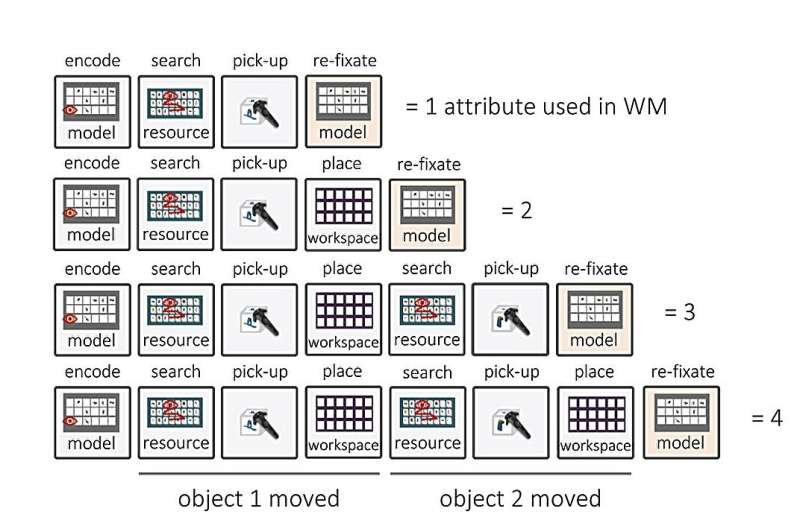
Trade-off between relying on WM and gathering information from the outside world. a Our implicit metric for working memory (WM) usage: Copying any object requires that its identity and location information (attribute) be held in memory. Counting successful retrievals (ie, identity attribute used) and placements (ie, location attribute used) between model fixations provided a metric for the number of attributes used in WM. b Average number of attributes used in WM in both movement effort conditions as a function of distraction, c distribution of attributes used in WM (%). Error bars depict the standard error of the mean (N = 30). The lines show the individual data of the participants. N indicates the number of total sequences included in the analysis The symbols *, ** and *** in the figure indicate statistical significance with p-values less than 0.05, 0.01 and 0.001, respectively. Credit: Kumle et al. (Psychology of communication, 2024, Springer’s Nature).
Humans in nature are well equipped to perform procedural tasks, such as following a recipe and assembling furniture. However, while completing these tasks, people may sometimes encounter visual distractions, such as irrelevant ingredients in the same cupboard as those listed in a recipe.
Ignoring these distractions, focusing on relevant objects, and successfully completing a task is usually easy for people, yet their presence can affect how tasks are completed. Exploring the potential effects of visual distractors during extended tasks in experimental settings has so far proved challenging.
Researchers at the University of Oxford and Goethe University Frankfurt recently began investigating these effects using virtual reality (VR) technology. Their findings, published in Psychology of communicationsuggest that visual distraction has several consequences, notably slowing people’s movements as they perform tasks and forcing them to perform more actions.
“Visual distraction is a ubiquitous aspect of everyday life,” Levi Kumle, Melissa LH Võ and their colleagues write in their paper. “Studying the consequences of distraction during temporally extended tasks, however, is not tractable with traditional methods. We developed a virtual reality approach that segments complex behavior into cognitive subcomponents, including encoding, visual search, use of working memory, and decision-making.”
Kumle, Võ and their colleagues recruited 30 participants and asked them to take part in two experimental trials, approximately one week apart. During these trials, participants were asked to complete a task in VR, wearing an HTC Vive Tobii Pro VR headset and an HTC Vive controller.
Participants navigated two different virtual environments, called the instruction room and the test room. After confirming that they could effectively use the VR equipment in the instruction room, they could proceed to the test room, where they completed a simple task.
This task involved selecting 8 target objects from a source pool containing 24 objects, some of which were irrelevant to the task and thus visually distracting. On a model screen, participants could see the target objects they had to select and how they had to arrange them within a workspace.
Their task was to reproduce the configuration of objects on the screen by taking objects from the resource pool and placing them on the workstation, all within a limited time. The researchers varied the location of the model display and the ambiguity of the objects in the resource array (ie, making them more difficult or easier to identify), to determine whether this affected participants’ performance on the task.
“Participants copied a screen model by selecting objects from a pool of resources and placing them in a workspace,” the researchers explained. “By manipulating the distraction of objects in the resource set, we revealed the interfering effects of distraction on different cognitive subcomponents.”
Interestingly, the researchers found that visual distractions affected the sensory-mnemonic decisions of the study participants. This affected their ability to coordinate their working memory and encode information while trying to complete the task, which was manifested in a slowing of their actions and the performance of more costly body movements.
“We successfully traced the consequences of distraction all the way from overall task performance to decision-making processes that inhibit memory use,” the team said. “Distraction slowed behavior and increased costly body movements. Critically, distraction increased encoding demands, slowed visual search, and decreased reliance on working memory.”
Overall, the findings suggest that visual distractions while people perform natural goal-directed behaviors may not necessarily prevent them from achieving a goal, yet they still have cascading consequences, slowing their movements and increasing the effort required to complete a goal. task. In addition to shedding new light on the effects of visual distractions, their study highlights the potential of using VR paradigms to conduct psychological and behavioral experiments.
More information:
Levi Kumle et al, Multifaceted consequences of visual distraction during natural behavior, Psychology of communication (2024). DOI: 10.1038/s44271-024-00099-0
© 2024 Science X Network
citation: Probing the effects of visual distraction during natural behavior using VR technology (2024, June 13) Retrieved June 14, 2024 from https://medicalxpress.com/news/2024-06-probing-effects-visual-distraction-natural. html
This document is subject to copyright. Except for any fair agreement for study or private research purposes, no part may be reproduced without written permission. The content is provided for informational purposes only.
